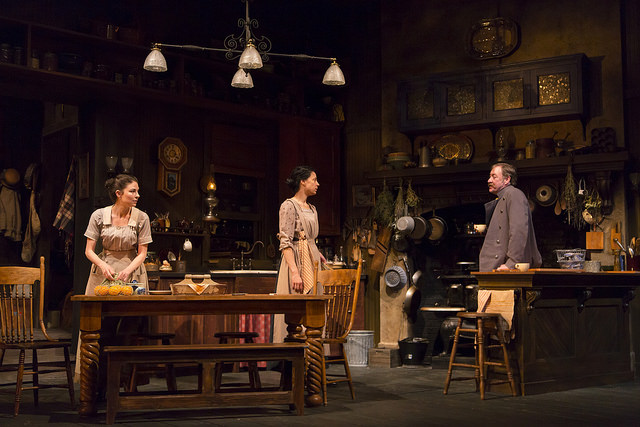
Photo credit: Hunting Theatre Co
Presented by Huntington Theatre Co.
Written by Huntington Playwriting Fellow Ronan Noone
Directed by Campbell Scott
Jan. 16 – Feb. 21, 2015
South End / Calderwood
Pavilion at the BCA
Huntington Theatre on Facebook
Review by Gillian Daniels
The class war still rages on. People from countries with fewer opportunities than ours wash up on the shores of America willing to work sixteen-hour days at thankless jobs. In “The Second Girl,” the audience is transported to the influx of Irish immigration in the earlier twentieth century. Specifically, we watch a full day in the life of Bridget O’Sullivan (Kathleen McElfresh) and aspiring actress Cathleen O’Leary (MacKenzie Meehan) in August 1912. Both work as maids for the summer home of wealthy employers. The carping and melodrama of our heroines’ everyday world is mined for a play that seems a little too grounded in the immigration stories that came before.
McElfresh and Meehan wonderfully and fully inhabit their roles. In Bridget, we’re treated to a callous but humane woman with a drinking problem. She bemoans her past in Ireland with a family that barely responds to her letters but seems unsure whether she wants to return or stay. Her employment at the Tyrones anchors Bridget as does her dependence on their liquor cabinet. Her alcoholism hits more of a stereotype, but her insistence that her red eyes are “just my rheumatism, that’s all” is endearing in its stubbornness. She butts heads with Cathleen often, their exchanges of words difficult to watch during the play’s first half.
Part of this is because, in contrast to Bridget, Meehan’s Cathleen knows exactly what she wants. We first see her struggling to memorize Miranda’s dialogue from The Tempest, striding across the stage even as Bridget informs her she just isn’t very good. Cathleen is too confident to care.
Cathleen has many of the play’s most humorous lines but is otherwise defined by the fiance she has back home and the wreck of the ship she took to get to the United States, the Titanic. The latter often feels more like a footnote than a significant trauma. If it wasn’t distressing for her, I wondered why someone with Cathleen’s drive wouldn’t exploit her part in such a significant, historical disaster to jumpstart the very acting career she longs for.
Other pieces of the play didn’t quite sit comfortably with me. Jack Smythe (Christopher Donahue), the chauffeur for the Tyrones, appears to have a budding romance with Bridget, but his insistence that “he knows she wants him” hints at a more gruesome person than the play would suggest. I found moments where I pitied Jack but Donahue cultivates a lone wolf of a man with whom it’s difficult to sympathize. His bullheaded advances toward Bridget despite her rejections are more creepy than beguiling.
Some staging choices are also off-putting but have more a reason to be so. I found myself at a loss as to why the curtain didn’t go down during the intermission and why the actors remained on-stage, continuing to bake and clean. At first, I figured there might have been a production mistake, but then I realized it was an attempt to show us the very thing the play promises with its opening: a day centered on the lives of people behind the scenes. From 7am to 7am, we watch those trying to eke out a living serving those who tend to be the focus of attention. Even if the audience gets a break, they do not. It’s another day at work and it’s a clever touch. Also, the set is so gorgeous and lovingly detailed, I was pleased to have a longer opportunity to study it.
I appreciate the chance to see into the lives of several individuals who don’t tend to get the spotlight. The majority of voices in historical fiction still tend to belong to the rich and glamorous. Writer Ronan Noone and director Campbell Scott give us a vision of people trying to balance inner-turmoil and outward respectability when dealing with their employers. One of the play’s strongest moments has Cathleen, fresh from a fight with Bridgit, plastering a smile on her face before returning to the rest of the house. If the play had concentrated on more nuanced moments like these, had really dived beneath the surface, it would have pushed its story right over the top.
